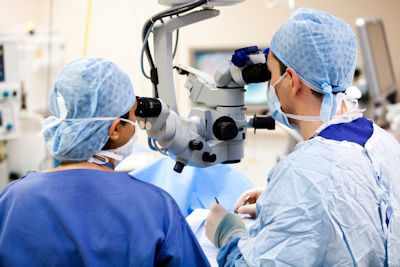Are You Awake During Cataract Surgery?
If you have been told that you need cataract surgery, or suspect you will likely need surgery in the future, you probably have lots of questions about the surgical procedure. What is the surgery like? Are you awake during cataract surgery? At Elmquist Eye Group, we understand you have questions, and we are here to answer them.
What can I expect from the surgery?
 Surgery is the only way to repair a cataract. At first, during early-stage cataracts, we may be able to more frequently change your eyeglasses or contact lens prescription to adjust for the growing cataract. Eventually, however, surgery will be needed.
Surgery is the only way to repair a cataract. At first, during early-stage cataracts, we may be able to more frequently change your eyeglasses or contact lens prescription to adjust for the growing cataract. Eventually, however, surgery will be needed.
The surgery is done as an outpatient surgery, and patients are typically awake but sedated during the procedure. The surgeon will stay in communication with you during the entire procedure, asking you how you are doing. We will provide an oral sedative prior to surgery to assure your complete relaxation and alleviation of discomfort. We sometimes offer the choice of intravenous (IV) medication to help you remain calm and comfortable.
What is the post-surgery period like?
We only operate on one eye at a time, and the procedure takes an hour or less. We will monitor you for a short period of time after your procedure, but then you will be able to go home. Someone must be there to drive you home. We will send you home with eye drops to minimize discomfort and prevent infection. Some patients experience itchiness as the eye heals, but it typically subsides in a couple of days.
Before you leave our surgical center, we will provide you and your driver with extensive instructions regarding post-surgery eye care. You’ll need to take it easy for a couple of days, and avoid bending and lifting for at least a week, so you may want to get some help around the house during that time. In the rare case that you do experience any pain, this is easily remedied with the short-term use of over-the-counter pain medication.
What happens if my cataracts are not treated?
Cataracts do not go away on their own, so they should not be left untreated. There are several remedies we can use to slow the progression of the cataract. There are steps you can take as well, such as wearing sunglasses to protect your eyes from sun exposure, and taking plenty of vitamins C and E, and omega-3 fatty acids to provide eye nutrients. We are often successful at helping people by changing their eyeglasses or contact lens prescription more frequently to help with vision as the cataract progresses. Surgery is ultimately needed to remove the cataract, and our expert surgeons can answer all your questions about it.
What will happen if your cataract is left untreated? Unfortunately, untreated cataracts are the leading cause of vision loss and blindness in the world today. Without any surgical intervention, the cataract continues to grow and affect vision, so let us help preserve your precious eyesight.
The Elmquist Difference
At Elmquist Eye Group, we understand that you might be apprehensive about having surgery. We also understand that you may have questions like: “Are you awake during cataract surgery?” Many people put off cataract surgery because they are worried about unanswered questions.
Isn’t it better to come in and see one of our board-certified surgeons so that we can help? We will do extensive eye tests to determine whether you are a candidate. In short, we will give you the answers you need. Come see us. We want you to be our next patient.
